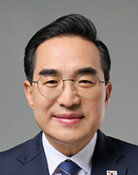Obstacles Ahead for New Uri Chair
Obstacles Ahead for New Uri Chair
Posted February. 20, 2006 03:01,
Chung Dong-young, the newly elected chairman of the ruling Uri Party, sent a letter yesterday morning to senior members of his party after his victory in the February 18 Uri Party convention. In his letter, he wrote, I feel excitement. But I find it extremely difficult to contain my fear. Chung and his supporters gathered at the center for war veterans in Songpa-gu, Seoul after the convention, but they did not look like they were in the mood to celebrate.
Chungs associates echoed this sentiment, saying, We won. But we have a long way to go ahead of us. A single victory is not enough to cheer us up.
For the next 22 months before the presidential election, Chung will have to overcome a variety of obstacles. Every single path he chooses will be a bumpy one with many dangers.
The party convention itself was far from a public relations success. The initial goal of the governing party was to raise its job approval rating by staging an exciting and closely fought contest between potential candidates. The competition between Chung, a promising presidential hopeful in the ruling party, and Kim Geun-tae, the newly appointed standing advisor, was supposed to provide insight into the actual presidential election. Despite the high expectations, the contest ended up as a big event only among Uri Party members.
The disappointment surrounding the election is a reflection of the fact that the combined approval rating of Chung and Kim has fallen behind that of the sole leading opposition candidate. The ruling party adopted A Strong Uri Party as its slogan, but from the very beginning of its presidential election campaign, the party has come face to face with its limitations.
Even the May 31 local elections, the first litmus test for the ruling party, pose serious challenges the party is not prepared for. During his nomination process, Chung said, We should win half of the 16 gubernatorial seats and half of the seats on all local councils. Yet, the electoral outlook for the Uri Party is not that bright.
Chung admitted himself that he needs much more than his own willingness to guarantee a victory for his party in the local elections when he held a press conference on February 18 after winning the nomination and said, In the upcoming local elections, we fall short of the strength necessary to deliver judgment on the Grand National Partys (GNP) 10-year dominance of local government. If we can collaborate with former Prime Minister Goh Kun, he will be of enormous help to us.
The former prime minister sent an immediate congratulatory message to Chung on his victory, but a single congratulatory card does not necessarily mean his commitment to cooperation with Chung.
Even if collaboration occurs, Chung will have to wage all-out war with the former prime minister over the presidential candidacy. Gohs decision to help the Uri Party could be a double-edged sword for Chung.
The first stop on his schedule was a visit to Daegu, a GNP stronghold, yesterday. Chung went to the graveyard where executed Peoples Revolutionary Party members are buried to pay tribute to them. The act is a very symbolic one because it is a challenge aimed at Park Geun-hye, the GNP leader and daughter of the late former president Park Jung-hee. The Peoples Revolution Party incident that eventually resulted in several executions occurred during the Park administration.
The key to the Uri Partys electoral success is capturing as many hearts as possible in the Yeongnam (southeastern) region and losing as few votes as possible in the Honam (southwestern) region, a dual mission that is very difficult to achieve. The Yeongnam region is still hardly within the Uri Partys reach. The Honam region, and in particular, Gwangju and South Jeolla Province, are where the Millennium Democratic Party exercises great influence.
Yet another threat to Chung is the alliance between Kim Geun-tae and Kim Doo-kwan. Kim Geun-tae and Kim Doo-kwan were elected as the partys standing advisors, coming in second and third, respectively, in the nomination race. Chung won the chairmanship, but he does not dominate his party completely, according to results of the Uri Party convention elections.
At the convention, Chung and his running mate Kim Hyeok-kyu, another standing advisor, received a total of 7,270 votes in a narrow victory over Kim Geun-tae and Kim Doo-kwan, who gained a total of 7,065 votes.
Without a victory in the coming local elections, Chungs leadership is likely to suffer a fatal blow from within.
Another daunting task before Chung is to align a group of young second-term lawmakers (who did not manage to get into the party leadership, but who did gain ground at the convention), neutral senior members, and legislators from the Honam region and first-term legislators who are considering turning to Goh Kun, to his side.
Jung-Hun Kim Dong-Yong Min jnghn@donga.com mindy@donga.com




![[단독]“거부도 못해” 요양병원 ‘콧줄 환자’ 8만명](https://dimg.donga.com/c/138/175/90/1/wps/NEWS/IMAGE/2026/03/02/133450041.2.jpg)


